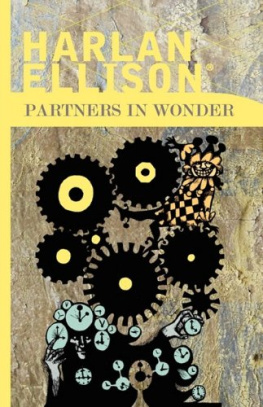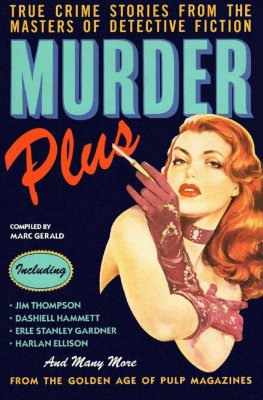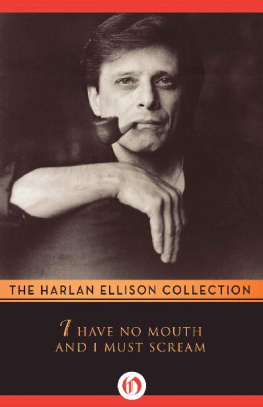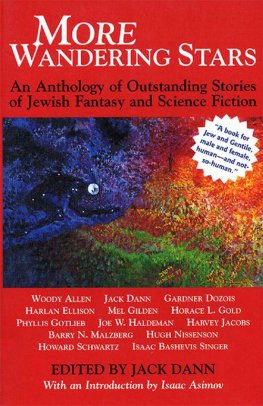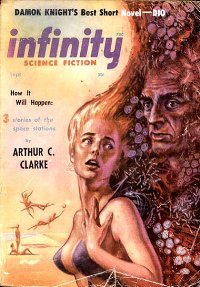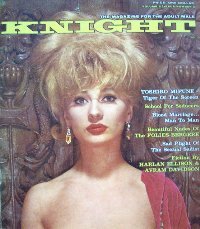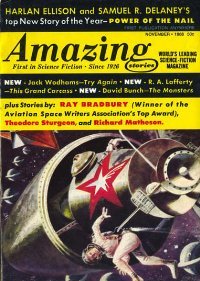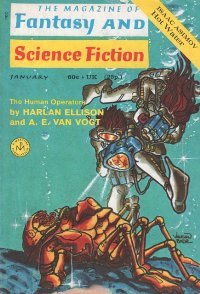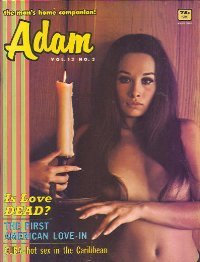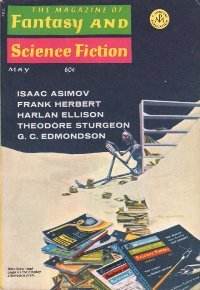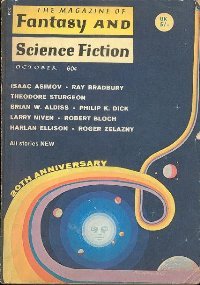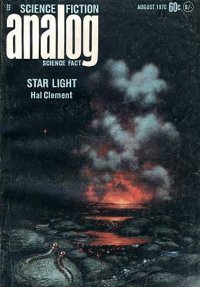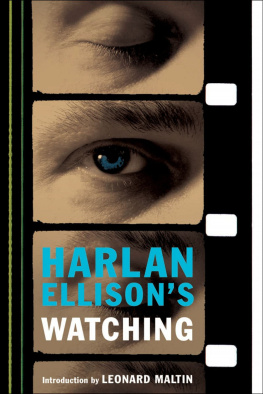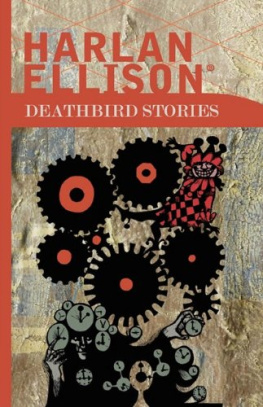Harlan Ellison - Partners in Wonder
Here you can read online Harlan Ellison - Partners in Wonder full text of the book (entire story) in english for free. Download pdf and epub, get meaning, cover and reviews about this ebook. year: 2009, publisher: e-reads.com, genre: Detective and thriller. Description of the work, (preface) as well as reviews are available. Best literature library LitArk.com created for fans of good reading and offers a wide selection of genres:
Romance novel
Science fiction
Adventure
Detective
Science
History
Home and family
Prose
Art
Politics
Computer
Non-fiction
Religion
Business
Children
Humor
Choose a favorite category and find really read worthwhile books. Enjoy immersion in the world of imagination, feel the emotions of the characters or learn something new for yourself, make an fascinating discovery.
- Book:Partners in Wonder
- Author:
- Publisher:e-reads.com
- Genre:
- Year:2009
- Rating:4 / 5
- Favourites:Add to favourites
- Your mark:
- 80
- 1
- 2
- 3
- 4
- 5
Partners in Wonder: summary, description and annotation
We offer to read an annotation, description, summary or preface (depends on what the author of the book "Partners in Wonder" wrote himself). If you haven't found the necessary information about the book — write in the comments, we will try to find it.
Partners in Wonder — read online for free the complete book (whole text) full work
Below is the text of the book, divided by pages. System saving the place of the last page read, allows you to conveniently read the book "Partners in Wonder" online for free, without having to search again every time where you left off. Put a bookmark, and you can go to the page where you finished reading at any time.
Font size:
Interval:
Bookmark:
DOUBLE TROUBLE
Harlan Ellison (whom The New Yorker calls a nonstop controversialist who comes on like an angry Woody Allen) is a very special kind of writer. If this is your first encounter with him, defend yourself from attacks on your world-view. Because he is the only one who can write Harlan Ellison Stories. His friends, outstanding fantasists like the legendary Theodore Sturgeon, Hugo/Nebula winner Roger Zelazny, A.E. Van Vogt (whose fame in France rivals that of Steinbecks), Psycho author Robert Bloch, Edgar- winningnovelist Henry Slesar and the swashbuckling writer/adventurer Robert Sheckley, are also special. What they do, no one else can do. But can they work together on the same story? What happens when Ellison mixes with the antic Avram Davidson? What comes out when talents as clearly different as Ellison and Van Vogt write together? How do you categorize the hybrid produced by the coolly scientific Ben Bova and the irrationally visceral Ellison (in a story whose plagiarization by ABCTV and Paramount Studios won a Federal District Court judgment for the authors in the amount of $337,000)? And how well do two dominating personalities such as Silverbergs and Ellisons get along in the same storyline? This book will tell you!
PARTNERS IN WONDER
IN COLLABORATION WITH
Robert Bloch
Ben Bova
Algis Budrys
Avram Davidson
Samuel R. Delany
Joe L. Hensley
Keith Laumer
William Rotsler
Robert Sheckley
Robert Silverberg
Henry Slesar
Theodore Sturgeon
A.E. Van Vogt
Roger Zelazny
and unassisted
this book is dedicated--with a little help from our friends--to
JUDY-LYNN DEL REY
For kindnesses remembered
CONTENTS
I See a Man Sitting on a Chair, and the Chair Is Biting His Leg
Brillo
A Toy for Juliette
The Prowler in the City at the Edge of the World
Up Christopher to Madness
Runesmith
Rodney Parish for Hire
The Kong Papers
The Human Operators
Survivor #1
The Power of the Nail
Wonderbird
The Song the Zombie Sang
Street Scene
Come to Me Not in Winter's White
SONS
OF
JANUS
INTRODUCTION
These are stories I have written with other writers. Collaborations, theyre called. They are the products of two minds working together, sometimes in complete harmony, more often in opposition. The former, because the ideas were so right they needed no conflict to produce a coherent whole; the latter, because writers are perverse creatures who enjoy tormenting one another. And also, conscious opposition on the part of one of the collaborators, to the direction a story is taking naturally, may produce a stress that bends it unexpectedly in a to ally unpredictable way. And from that can come a toad prince or a toad, depending on whether or not both writers know how to handle a fable run amuck.
The beloved Lester del Rey--one of my early mentors in the craft of professional lying-told me once : never write a story with someone, that you can do as well by yourself. Well, I believe that. I tried writing a novel with Avram Davidson once, titled Dont Speak of Rope, Ech. One of the most horrible experiences in a universe filled with death camps, hardhats, campus massacres and the human gamut that runs from Spiro to Manson; somewhere in a file drawer languish ten thousand words of that novel, unended, unlamented, unfortunate. So I do, I really do, agree with Lester.
Even so, life can occasionally become dull and predictable, and so, to spice it slightly, those of us with a flair for danger and high adventure take guided tours through the heart of Mt. Vesuvius, stalk the blood-sucking vampire bat through the swamps and fens of Bosnia and/or Herzogovina, join peace rallies, date beautiful models and, when all else fails, collaborate on fictions with other writers. I grant you the picture of world-weariness and jaded appetite I paint, the desperation of ennui that drives men to such hideous extremes as collaboration, is an ugly one. But I feel you must know what horrors and pitfalls lie behind this seemingly uncomplicated act. Ask Avram. Ech.
But the reward of successful collaboration is a thing that cannot be produced by either of the parties working alone. It is akin to the benefits of sex with a partner, as opposed to masturbation. The latter is fun, but you show me anyone who has gotten a baby from playing with him or herself, and Ill show you an ugly baby, with just a whole bunch of knuckles.
And so, risking the hisses and catcalls of overly critical readers and critics who will call these joint efforts (if youll pardon my carrying on the allusion from the preceding paragraph) merely gimmicky constructs, over the past many years I have yoked myself to fourteen other writers, and from these literary miscegenations have come the fictions before you.
My relationships with all of these men have been substantially more than what might be termed mere acquaintanceship. All of them are my friends, but not all of them like me. Nor do I like all of them. Many of them have done me favors I would be hard-pressed to repay in full or in kind. Others have messed me over hideously. From time to time I have been in serious disagreement with one or another of them. Between one of them and myself there was a shadow for many years. Between myself and another is something very much like the love of one brother for another. One saved my life, literally. I thought another had ruined it. One made me terribly proud of him, and then sold out, thereby destroying all my illusions about him. Two of them managed to alter the course and texture of my life. From one I learned much about the nature of love, from another the nature of hate. With one I dreamed odd dreams, and with another I learned people can only act as people, not as gods. One demonstrated there can be nobility even in failure, and another showed me how badly success can be handled.
Millions of words of conversation in the past nineteen years have passed between me and these fourteen men. Advice, shoptalk, problems, respect and denunciation. That is the nature of friendship.
But without these men, I would never have come to write the solo stories on which my reputation--however great or small it may be--is based. Without all the words they have given the world on their own, some larger part of the joy of having been a part of speculative fiction would never have been. Bloch and his psychos and the Ripper; Bovas clear view of the importance of space travel; Budrys and the Gus nobody bothers; Davidson and his sentient coathangers; Delany and frelking; Hensley and his son, Randy; Laumer and Retief; Rotsler and a stack of cartoons only slightly smaller than Everest; Sheckley and all his dimensions of wonder; Silverberg and thorns; Slesar and the greatest short-story ever written; Sturgeon and...well, everything; Van Vogt and weapon shops and Jommy Cross and the cortical thalamic pause; Zelazny and he who shapes.
All of them are masters, each of them writes only as he can write, and no two can ever be confused in the minds of students of masterful sf. These are the extra special meanings for me of these superimportant people:
Laumer is strength, and Davidson is erudition, and Budrys is empathy, and Delany is youthful commitment, and Sheckley is outrageous madness, and Sturgeon is both dazzlement and love, and Bova is the rationality of reality, Silverberg is craft, Van Vogt is complex conceptualization. Rotsler is irreverence, Hensley is gentleness, Zelazny is poetic intricacy, Bloch is coming to grips with terror, and Slesar is courage and pride and dignity.
I have learned these things from these men. So it is not merely by chance that we came together finally to write. It is heady company and only a fool or an amateur would consider working with them without a full realization of how good one must be to share the same story with each of them.
Next pageFont size:
Interval:
Bookmark:
Similar books «Partners in Wonder»
Look at similar books to Partners in Wonder. We have selected literature similar in name and meaning in the hope of providing readers with more options to find new, interesting, not yet read works.
Discussion, reviews of the book Partners in Wonder and just readers' own opinions. Leave your comments, write what you think about the work, its meaning or the main characters. Specify what exactly you liked and what you didn't like, and why you think so.

